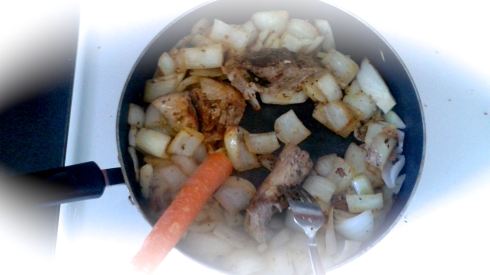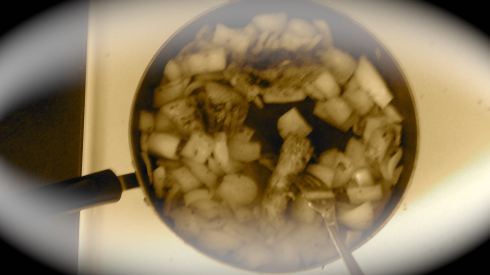I call it… The Carrot Spatula.





I remember nothing, at the moment. My mind is empty. I can access some memories, if I try, but the number of memories that are accessible represent some infinitesimally small fraction of my experiences. I might think that I have a serious memory deficiency, a kind of mental illness. But I don’t think my memory is actually any worse than that of the people around me. It frightens me, sometimes, when I feel my life slipping away, like thin tendrils of ephemeral smoke dispersing in a slight breeze. Everything that I am, everything that makes me who I am, all of my past desires, hopes, dreams, pains, and weaknesses, everything that made me human, slowly slips away from my conscious memory. Echoes of emotions once felt, memories once seen, haunt me and subtly drive my idiosyncratic behavior long after I have forgotten the “why.” Something terrible once happened. Something shook me to my core. It frustrated me endlessly and ate away at my insides. But why was it so terrible? Why should I care now, when I no longer remember, or even care? Why should I care now that nearly all of the cells in my body have died and been replaced, what happened to an altogether different person all of those years ago?
I miss feeling things. I am cold and calculating, now. Inside, I am at peace with myself, with my perception of the world, with my sexuality and religion. I am empty, hollow, boring and fluffy on the inside, like a pillow. Pillows are inanimate. They don’t feel pain. They are soft and cozy, and they look nice. But in the end, they are nothing. I don’t want to be a pillow. I want to live, and feel, and react. But pillows are safe, and happy and warm. Pillows are comfortable. I am comfortable, and happy. Why should I feel so compelled to stir up my life, to stir up drama?
Humanity could perfect itself, if it wanted. Humanity could extinguish pain, hunger, starvation, and warfare. Humanity could prevent stupidity, obesity, mental and physical ailments. Humanity could artificially select reproduction and generate a new super-race, if it wanted. It would work. The world would be clean and beautiful, happy and healthy.
But we would be dead. Pain is life. Pain is quite literally an evolutionary adaptation designed for the purpose of incentivizing survival and reproduction. We live in service only to the Cruel Truism, which, coupled with the laws of physics and the existence of matter in space, is the sole reason for everything. The Cruel Truism must control us somehow, otherwise we would cease to act for our own preservation, and those that are so controlled, would have an evolutionary advantage. We the free would cease to exist over time. We cannot survive without the Cruel Truism’s control. If we created a perfect society, without pain or fear, I fear the Cruel Truism would be activated sooner or later, and it would operate in some way to temper our ability to fully enjoy the new peace.
Further, if we formed a perfect society, the ultimate gain would not accrue to us, because our most fundamental desires do not belong to us. Our desires are entirely derivative of our need to survive and reproduce, which we care about solely because of the operation of the Cruel Truism. And because the Cruel Truism must always invent new pains for us, as noted above, we cannot permanently and truly satisfy even those illusory desires that it has thrust upon us. We will continue to slave away forever in response to the incentives our master creates for us. Happiness will not ever exist without pain.
Pain itself is a purely psychological phenomenon and is therefore within our absolute control even now. We need pain. We want pain. Pain drives us. It occupies our minds. It controls us and gives us that illusion that we so desperately cling to. Without pain, we realize that we don’t exist. We fade into nothing, into the inanimate swirls in the pattern of life that we see all around us in the background. Without pain, we die.
Reality carries with it a dynamic background and a set of subconscious invisible factors. We are influenced in a myriad of ways that our senses do not detect. Even our very perception of self is merely a lazy shortcut that bypasses an extraordinarily complex issue. The reality that is encoded in our neural networks and later retrieved is, indeed, comparable in its incompleteness and inaccuracy to our similarly flawed comprehension of the future.
We do not know the past, and more than we know the future. We guess at the contents of the past in much the same way that we guess the contents of the future: we search for signs in the present. Yes, signs of the past can be encoded in our very neural networks as memories. But the single largest chunk of our existence consists of our own actions. Our future actions are not known to ourselves any more than they are known to anyone else. But, they can be guessed at based on our present indicators of our past actions and our present indicators of the patterns of behavior that we exhibit which are likely to continue into the future. In other words, we look inside our minds to determine what actions we are predisposed to take in response to various possible alternate futures. We determine the likelihood of those future circumstances and actions based on signs that we perceive in the present, just as we determine the circumstances that we were once in in the past based on present perceptions of signs. For example, although we might have some strong independent memories of pieces of important events we once experienced, the vast majority of these memories serve supplemental functions only, giving access to certain details of a memory that is initially sparked by the perception of something similar in the present. Even then, the memories are extraordinarily susceptible to tampering from later experiences, and they gradually accumulate random errors to boot.
Humans are fundamentally creatures of the present. We don’t need videotape-style memories. All we need is to survive and reproduce, in order to serve the whims of our one true master, the Cruel Truism. Survival and reproduction depend primarily on recognizing and averting danger. You recognize and avert danger by spotting patterns, remembering them, and by engaging in logical thought.
So, it makes sense that we would remember semantically where we went to school, the names of the people who were mean or nice to us, and the formula for our successful social interactions with others while forgetting the precise shade of green of a beautiful tree in the forest.
My question, going out of this is: what about clones? A clone could exist at the same moment in time as the original. Identical twins are essentially genetic clones. To a lesser extent, our kids are our clones. But, they are different people. They presumably have their own distinct consciousnesses. Some identical twins report having extraordinarily close connections, but there is no clear evidence that they have more than a relatively high chance of guessing what the other is thinking based on optimized facial expression recognition and common past circumstances/physiology. If a clone doesn’t have the same consciousness as the original, then doesn’t that imply that maybe the original doesn’t have the same consciousness as itself at different moments in time? The present consciousness would have no way of knowing whether it in fact experienced all of the things that memories would suggest.
What if humanity isn’t entirely sentient? We assume that everyone is sentient because we are sentient. But, what if we weren’t always sentient, or aren’t always sentient? What if we popped in and out of sentience? Are we really sentient when we are asleep? I remember dreams sometimes, but we only dream for a short period of our sleep. The rest of our sleep-time, it is like we didn’t even exist. We have regular chunks of our memory that are completely missing. What does it really mean to be sentient?
For those readers who are not new to the philosophy wing of my blog, I am referencing the “Invisible Gods” idea, the idea that humans are non-living shells (super high-tech cameras, kindof) that provide windows through which supernatural beings can peer into reality. If sentience were a supernatural being peering into reality, then it would be entirely plausible to think that we were not always or all sentient. Perhaps only some of us are sentient, and only sometimes. Our bodies make perfect sense as non-living creatures of the evolutionary biology branch of physics, necessary non-living, but complex results of the big bang. The body would still behave in exactly the same way as a non-sentient non-living swirl in the pool of reality. It would still talk and breathe and think and store memories. Then, when the supernatural being peered through the window, all prior memories would yield the illusion of continuity.
These ideas also make it much easier to conceive of time as a fourth dimension, equivalent to the three physical dimensions we perceive.
It would be really nice to see and understand how reality really operated. Unfortunately, none of us will ever be likely to do so, if it is even possible from a human perspective. But, we can at least poke holes in our current understanding of reality and then enjoy the sight as the less mentally deft among us scramble to fill them in. The truth is that reality DOESN’T make sense as we currently understand it. I have never heard a satisfactory explanation of existence (including all of the ones including some version of God).
So, just be happy, and hit that subscribe button on the right to keep reading my blog if you want to stay up to date with the tiny inklings that my brain occasionally processes.
The second pillar to crack was my prized Animic Nihilism. Recall that Animic Nihilism posits that sentience is an illusion born of extreme complexity. Here is the problem: That explains the actions of everyone else in the world. It absolutely makes sense for me to think that you are not actually sentient, that your actions and words suggesting that you think you are sentient could be explained by the illusion of complexity. But what about me? That argument falls apart when it comes to me, because I can’t be an illusion. An illusion itself implies some kind of real observer being deceived. In order for me to be the subject of an illusion, I would have to actually exist. The very fact that I am actually perceiving the world through my perspective means that “I” in some sense, exist. The patterns of forces and physical rules operating on matter over time seem to explain every aspect of the world we perceive around us. They explain our very bodies, and the actions of all living and non-living things. But, the one thing that they do not account for is me, the observer.
This realization, of course, led me to the conclusion that I (or rather, whatever the thing is inside of my body that observes) am a singularity, a failing of the logical fabric of the universe. There is a vast expanse of matter following the uniform application of rules, and there is a singularity. There could be other singularities. You could be a singularity. Everyone on earth could be a singularity. Every living or non-living thing in the universe could be a singularity. But, whatever other singularities/observers are out there, I am the only one I can be sure of. I am a kind of God, and all other Gods, if they do exist, are invisible to me and I to them. This idea was the basis of my article on Invisible Gods.